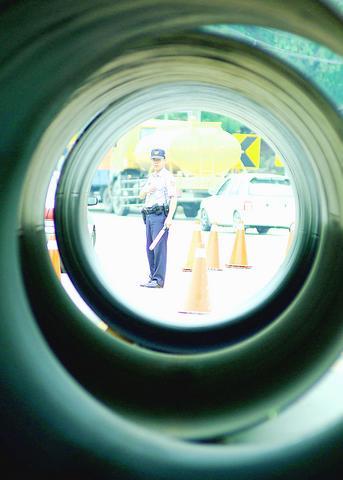The week-long water shortage in Taoyuan County has caused damage estimated at NT$10 billion (US$285.7 million) to industrial infrastructure in the county's industrial zones -- as well as the death of one water company official due to heart failure.
As of Wednesday, estimated losses reported by some 310 firms and factories at the Kuanying Industrial Park (

PHOTO: CNA.
Worst hit were high-tech, biochemical and petrochemical companies, with daily losses estimated at between NT$700 billion and NT$800 million (US$20 million and US$22.8 million), he said.
The water cuts since Aug. 25 were not caused by drought, but by torrential rains triggered by Ty-phoon Aere, which washed tonnes of mud into the Shihmen Reservoir in Taoyuan outside Taipei.
The muddy water paralyzed almost all of the reservoir administration's purification systems, resulting in a water stoppage to most of Taoyuan, whose water supply comes mostly from the reservoir. Chiu said of the 350 firms in the park, production at 310 companies has either stopped or been reduced.
Amid firms' anger over the government's failure to restore water, technicians at the Taiwan Water Supply Corp (
After five sleepless days to help restore the water supply, Wu Chin-niu (
Wu was immediately sent to a hospital nearby but died in the evening. Minister of Economic Affairs Ho Mei-yueh (何美玥), who was asked by Taoyuan County Commissioner Chu Li-lun (朱立倫) to step down over the government's failure to restore water, was filmed by local cable television stations as she shed tears over the technician's death at the hospital in Taoyuan.
Ho reiterated yesterday that the ministry and the water company would seek to resume at least part of the normal supply for Taoyuan residents and some industrial parks tonight.
Chen Shen-hsien (陳伸賢), director of Water Resources Agency under the Ministry of Economic Affairs, said the water supply will be restored on a rotation basis in southern Taoyuan tomorrow morning. Premier Yu Shyi-kun promised on Tuesday to fully resume the system by Sept. 8.
The central government has allocated NT$150 million (US$4.2 million) in relief funds for Taoyuan residents to buy bottled drinking water.
The Taoyuan local government also lifted its ban on drilling wells to try to ease the shortage.
If normal supply is not restored soon, big firms like notebook computer maker Quanta Computer Inc (
Four nearby industrial zones with more than 400 firms have also reported combined losses of at least NT$2 billion (US$57 million), zone officials said.
A number of firms, including Acer Inc, were forced to spend at least NT$600,000 (US$17,142) a day to buy water in order to maintain their production lines, they said.
Both the Consumer Protection Commission and Fair Trade Commission called on related businesses, including water transporters and retailers selling bottled water, not to jointly force up prices of their products and services, according to statements released yesterday.
Violators can be fined up to NT$250 million.

SEMICONDUCTORS: The German laser and plasma generator company will expand its local services as its specialized offerings support Taiwan’s semiconductor industries Trumpf SE + Co KG, a global leader in supplying laser technology and plasma generators used in chip production, is expanding its investments in Taiwan in an effort to deeply integrate into the global semiconductor supply chain in the pursuit of growth. The company, headquartered in Ditzingen, Germany, has invested significantly in a newly inaugurated regional technical center for plasma generators in Taoyuan, its latest expansion in Taiwan after being engaged in various industries for more than 25 years. The center, the first of its kind Trumpf built outside Germany, aims to serve customers from Taiwan, Japan, Southeast Asia and South Korea,

Gasoline and diesel prices at domestic fuel stations are to fall NT$0.2 per liter this week, down for a second consecutive week, CPC Corp, Taiwan (台灣中油) and Formosa Petrochemical Corp (台塑石化) announced yesterday. Effective today, gasoline prices at CPC and Formosa stations are to drop to NT$26.4, NT$27.9 and NT$29.9 per liter for 92, 95 and 98-octane unleaded gasoline respectively, the companies said in separate statements. The price of premium diesel is to fall to NT$24.8 per liter at CPC stations and NT$24.6 at Formosa pumps, they said. The price adjustments came even as international crude oil prices rose last week, as traders

Taiwan Semiconductor Manufacturing Co (TSMC, 台積電), which supplies advanced chips to Nvidia Corp and Apple Inc, yesterday reported NT$1.046 trillion (US$33.1 billion) in revenue for last quarter, driven by constantly strong demand for artificial intelligence (AI) chips, falling in the upper end of its forecast. Based on TSMC’s financial guidance, revenue would expand about 22 percent sequentially to the range from US$32.2 billion to US$33.4 billion during the final quarter of 2024, it told investors in October last year. Last year in total, revenue jumped 31.61 percent to NT$3.81 trillion, compared with NT$2.89 trillion generated in the year before, according to

PRECEDENTED TIMES: In news that surely does not shock, AI and tech exports drove a banner for exports last year as Taiwan’s economic growth experienced a flood tide Taiwan’s exports delivered a blockbuster finish to last year with last month’s shipments rising at the second-highest pace on record as demand for artificial intelligence (AI) hardware and advanced computing remained strong, the Ministry of Finance said yesterday. Exports surged 43.4 percent from a year earlier to US$62.48 billion last month, extending growth to 26 consecutive months. Imports climbed 14.9 percent to US$43.04 billion, the second-highest monthly level historically, resulting in a trade surplus of US$19.43 billion — more than double that of the year before. Department of Statistics Director-General Beatrice Tsai (蔡美娜) described the performance as “surprisingly outstanding,” forecasting export growth